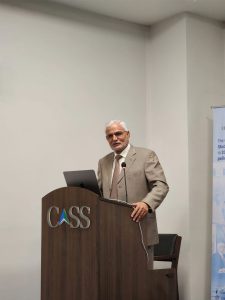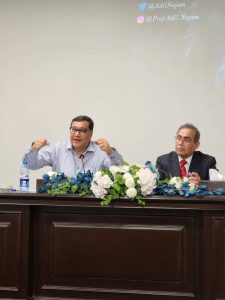Urgent Call for Adaptation: Climate Change Threats Highlighted in Distinguished Guest Lecture

The Centre for Aerospace & Security Studies (CASS), based in Islamabad, successfully concluded a Distinguished Guest Lecture titled ‘From Crisis to Opportunity: Harnessing Climate Change for Pakistan’s Sustainable Future’ by Dr Adil Najam, President WWF International and Dean Emeritus and Professor of International Relations and Earth and Environment at Boston University’s Frederick S. Pardee School of Global Studies. The lecture shed light on the pressing global issue of climate change and its far-reaching impacts on the environment and overall human society, especially for developing countries like Pakistan.
Air Marshal Ashfaque Arain (Retd), Advisor & Director Emerging Technologies at CASS, highlighted the pressing global issue of climate change and Pakistan’s vulnerability, despite its low carbon emissions. He warned that the melting of glaciers since 1997 had caused devastating consequences, including floods and reduced water availability, and stressed that a comprehensive plan for adaptation and mitigation was needed to safeguard Pakistan’s socioeconomic conditions and the well-being of its population.
Distinguished Guest Speaker, Dr Adil Najam, President of WWF International, provided invaluable insights during the lecture, shedding light on the urgency of addressing climate change. Dr Najam highlighted that we were now living in what he called the ‘Age of Adaptation’, where the world, particularly poorer and more vulnerable countries, were compelled to confront the impacts of climate change and adapt to them. He explained the distinction between mitigation and adaptation, adding that the politics of climate change had predominantly focused on mitigation since 1992 but countries like Pakistan needed to focus on adaptation. He highlighted that advanced countries needed to decouple economic growth from carbon production, enabling future global strategies to be conscious of environmental impacts and the persistent presence of climate change in the world. Dr Najam articulated that climate change should be viewed not just as a ‘carbon management’ challenge but as a development challenge and even a sustainable development opportunity.

The concept of security was another key aspect discussed by Dr Najam, who emphasised that security issues become existential when societies feel threatened about their survival, rendering cost considerations irrelevant. As evidence, he pointed to the swift allocation and spending of trillions of dollars by the US Congress in response to the existential threat of the COVID pandemic. Highlighting the climate crisis as an existential threat, he drew attention to the alarming increase in global temperatures, including recent record-breaking highs occurring multiple times within a week in the month of July.
The distinguished guest speaker identified water as a frontline issue for climate change adaptation, drawing a parallel between its significance and carbon in mitigation efforts. Additionally, he discussed the two primary aspects of energy in the context of climate change: clean energy and energy growth. For Pakistan, achieving energy security also required addressing energy poverty faced by the common citizen, he said. Addressing the failures in wisdom, climate negotiations, politics, and morality, Dr Najam noted the long-standing demand of the world’s most vulnerable countries for a Loss and Damage Fund (L&D), and its eventual acceptance at COP27, as a crucial step forward. However, he acknowledged that at present, such a fund did not exist and lacked funding.
Expressing concerns that climate change would exacerbate existing injustices and broken governance systems, disproportionately burdening the poor and vulnerable in Pakistan, Dr Najam called for a shift from a reactive to a preventive posture and advocated focusing on minimising ‘insecurity’ efforts rather than maximising security.
In his Concluding Remarks, Air Marshal Farhat Hussain Khan (Retd), President of CASS, Islamabad, hailed Dr Najam’s talk as a powerful wake-up call, urging Pakistan’s younger generation to take on the responsibility of confronting climate change head-on. Emphasising that climate change was already a reality, not a future phenomenon, he drew attention to the often-overlooked threat of sea-induced disasters, warning that their scale could surpass the devastating floods experienced by Pakistan in 2022. President CASS lamented the disproportionate impact of climate-induced disasters on marginalised communities, highlighting the need for equitable resource distribution. He advocated for a people-centric approach, decisive forward-thinking, and meaningful discourse to chart the most promising future course for Pakistan to effectively tackle the impacts of climate change and address governance shortcomings in this critical area.
The Distinguished Guest Lecture drew significant attention, with a healthy turnout (both in-person and online) as well as an engaging question and answer session. Attendees actively participated, reflecting their keen interest in understanding the complexities surrounding climate change and its implications for Pakistan. The event served as a platform for informed discussion and a call to action, emphasising the need for comprehensive solutions and institutional collaborations to ensure a climate-safe future for Pakistan.
Editor: Raja Kamran